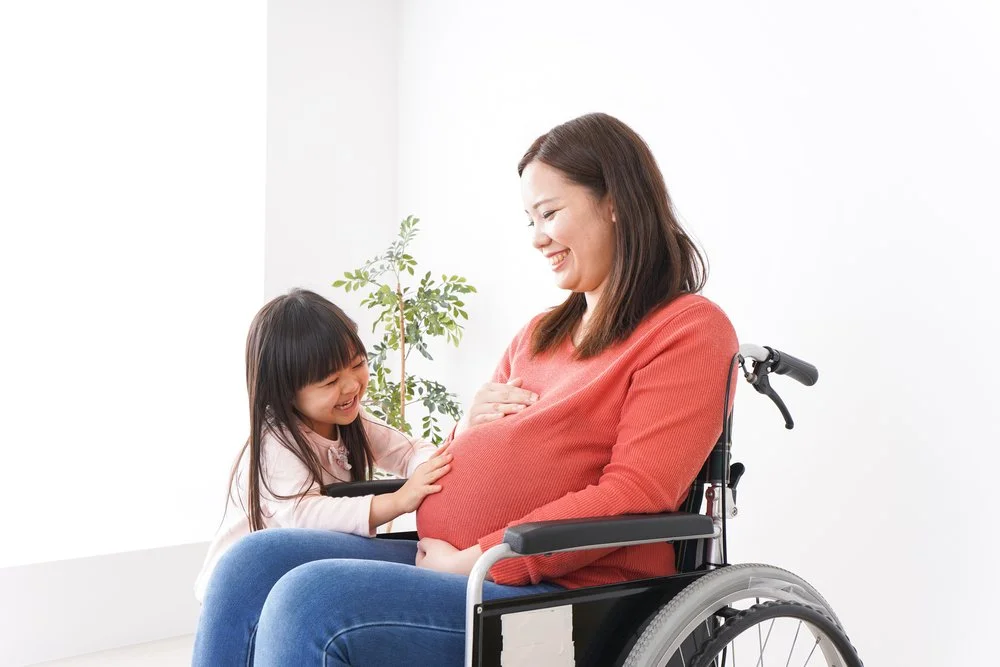Maternity Care in Ireland with a Physical Disability
Having additional physical needs, or a disability does not take away your rights or opportunity to make informed decisions about your care when pregnant. You may need to brainstorm different ways of doing things, but you can still have a beautiful, positive and empowering pregnancy, birth and parenting journey.
When I began researching to write this blog I was shocked at the lack of information and support for women / birthing people with a disability. I also came across so much discrimination in posts and information online.
In DoulaCare Ireland we always have a parent centred approach to our support and information. This is your journey and we hope to empower you to have the knowledge and confidence to advocate for your wishes. We do have an amazing team of doulas across Ireland who can offer you individualised continuity of care if you would like to know more email info@doulaacre.ie
So let’s start with your rights as a person with a disability or a medical condition that may impact your physical coordination or movement.
Your rights:
Every woman who is pregnant and ordinarily resident in Ireland is entitled to maternity care under the Maternity and Infant Scheme. The Disability Act requires the Department of Health and Children, as with other public bodies, to ensure that its services are accessible to people with disabilities, and to deliver an integrated service to people with and without disabilities where that is practical and appropriate.
It is fundamentally important that disabled women – like all women – receive dignified maternity care that respects their human rights.
You have the same rights as every other service user: Your care provider will develop an individual care plan for you, addressing specific needs of all women, including women with disabilities.
Irelands State parties must ensure that people with disabilities are afforded the same range, quality and standard of healthcare, either publicly or privately funded, as non disabled people. This means you have the same choice for your care pathway in your chosen maternity hospital. Depending on your medical needs you may not be eligible for a midwifery led unit but if midwifery led care is important to you, you can discuss that with your care team.
Each public body must have an Access Officer to provide for, arrange or co-ordinate the assistance to people with disabilities. Ask to be linked in with them at your booking appointment so you can get everything in place for a positive pregnancy ahead. For women with disabilities, team based primary care would facilitate accessibility and the provision of women-centred care in a co-ordinated and integrated manner. The multidisciplinary team may comprise of a GP, nurses, midwives, health-care assistants, home helps, physiotherapists, social workers, occupational therapists, and administrative resources to ensure you have fair and equal access to the maternity care you desire.
Maternity services are responsible for ensuring inclusiveness of women with a learning and physical disability and that the services must address the individual communication, support and equipment needs of such women. You may need to advocate for your needs at your booking appointment but should be facilitated with most requirements you have.
You should:
Receive individualised care and support
Be able to make informed choices about your maternity care
Be empowered, enabled, informed and supported to advocate for your rights.
Be listened to and treated as an individual.
Have access to maternity care that is provided in a physical environment that meets the needs of women with a physical disability.
Ask if the healthcare professionals and support staff who are working with you, are provided with disability competence training to equip them with the skills and understanding to provide person-centred care and support to women with disabilities, appropriate to their role.
Generally at the initial booking visit (around 12 weeks’ gestation) your needs are determined and an individualised care plan is devised and implemented to respond to and address your needs. If warranted, you can be referred to appropriate support teams or specialists, and services and/or support mechanisms are instigated.
Midwives, Doctors and hospital staff should ensure that the physical environment is accessible and the communicational and information needs of women with disabilities are met in an effective, appropriate and accessible manner.
Remember you know your body, abilities and limitations better than anyone else so take the time to educate your care provider about your individual situation so you can work together to have the positive experience you deserve!


